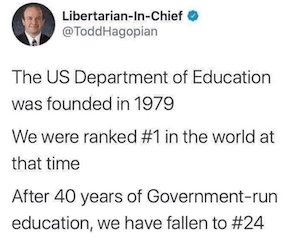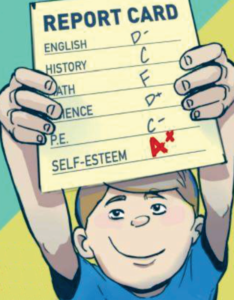Back in 2021, under an earlier rendition of this blog, I wrote an article entitled “American Exceptionalism at its Finest”, wherein I lamented the lack of education of American students in the corrupt public school system. I’ve republished that article at the end of this article, in light of the more current movements to abolish the Department of Education.
Creation
The United States Department of Education was started in 1980, having been created after the Department of Health, Education, and Welfare was split into the Department of Education and the Department of Health and Human Services by the Department of Education Organization Act, which President Jimmy Carter signed into law on October 17, 1979.
Failure
And though it’s disputed online, there’s a claim circulating (examples: here, here) that in 1979, the U.S. was #1 in education, but has dropped to #24 since the Dept of Education was created:

Regardless of whether that claim is true, it is common knowledge that many students are now graduating high school with only a grade-school level reading capability, with scores across the board at their lowest since testing began in 1992.
And, there’s the sad meme that floats around online: the government takes over education, and in just two generations students don’t even know what gender they are.
Abolition
Of course, it’s common knowledge that on March 20 2025, President Trump Issued an Executive Order abolishing the Department of Education.
But many may not know that back in 2023 Rep. Barry Moore (R-AL) sponsored H.R. 938, which sets out to “abolish the Department of Education and terminates any applicable program for which it has administrative responsibility. . .[and] directs Treasury to make allocations to states to support elementary and secondary education.” According to Congress.gov, the bill was referred to the House Committee on Education and the Workforce in Feb 2023, and best I can determine, no further action has been taken (yet).
At any rate, I consider the abolition of the Department of Education to be a good thing, even if it means merely moving educational oversight to the state governments rather than privatizing it entirely, since the state governments may be a little more accountable to the people…
…because—as I also conveyed in my article Finally, Abolishing The TSA: Better Late Than Never—whenever the government takes over an industry, that industry becomes corrupt. Why? Because humans are corruptible, meaning corruption is inherent in human nature; and the most effective check against corruptible human nature is free market forces—i.e. competition, accountability, liability, transparency, consumer choice, etc.—and government is largely insulated from free market forces: there is no competition, little to no accountability, liability, or transparency, and certainly no “consumer” choice (we can’t get fed up and start doing business with the one of the “other” governments). And this is why every government, regardless of how it’s structured, becomes corrupt and eventually fails, then must be forcibly removed, instead of simply going out of business (not to mention that government itself is immoral). But I digress…
Now, here’s the aforementioned article from 2021:
American Exceptionalism at its Finest
In a 2014 article entitled The Nobel World by investment and financial author James B. Rogers, published over at LewRockwell.com, the author points out that, even though western nations are bankrupt and collapsing and eastern nations have seen phenomenal economic growth over the last few decades, the Nobel prize for economics continues to be awarded to economists in the economically failing western nations.
From the article:
“But 40 years later, the world is experiencing a historic shift from West to East. The great economic successes since 1969 are certainly not the United States or Europe. In this span, the US went from the largest creditor nation in the world to not just the largest debtor nation in the world, but the largest debtor nation in the history of the world. That U-turn may deserve a prize, but one that brings embarrassment rather than prominence.
Today, most major international creditor nations are found in Asia – economies like China, Japan, South Korea, Singapore, Hong Kong and Taiwan. Yet, of the 67 recipients who have received the economics prize, 52 are affiliated with US institutions and 14 have European affiliations. One was from the Hebrew University of Jerusalem. So despite the huge economic growth of Asia during a period of relative and absolute decline in Europe and America, no economist from an Asian institution has been lauded. Not a single one.
Singapore has been the greatest economic success of the past four decades, but former prime minister Lee Kuan Yew and Dr Goh Keng Swee, a former deputy prime minister who died in May,have never been acknowledged by Stockholm. And Dr Goh even held a degree from the London School of Economics.
China has also experienced huge economic success during this time, yet neither Deng Xiaoping nor any of his economists were ever awarded the prize.”
I must agree; it is indeed farcical.
And this dubious practice dovetails nicely with a recent study of US students in which it was discovered that—while scoring dismally low in academic performance as compared to students of other developed nations (25th in math and 21st in science)—they nevertheless topped the charts in…confidence.
From the documentary film Waiting For Superman:
“Since the 1970s, US schools have failed to keep pace with the rest of the world. Among 30 developed countries, we rank 25th in math and 21st in science. The top 5 percent of our students, our very best, rank 23rd out of 29 developed countries. In almost every category we’ve fallen behind—except one.”
So what is that one category, in which US students placed first among all developed nations? Why, confidence, of course!
“The same study looked at math skills, and found in these eight countries [shown in the video], the U.S.A. ranked last; but when researchers asked the students how they felt they had done—”Did I get good marks in mathematics?”—kids from the U.S.A. ranked number one in confidence.”
Here’s the clip:
And this isn’t the only citation of such confident ignorance on display with American students; in the documentary film Before The Music Dies, when asked what he’s learned from his students, the saxophonist, composer, and teacher Branford Marsalis laments the combination of ignorance and arrogance of his students:
“What I’ve learned from my students, is that students today are completely full of shit. That is what I’ve learned from my students…is that—much like the generation before them—the only thing they are really interested in is you telling them how right they are, and how good they are. That is the same mentality that basically forces Harvard to give out Bs to people who don’t deserve then, out of the fear that they’ll go to other schools that will give them Bs, and those schools will make the money.
We live in a country that seems to be just in this massive state of delusion, where the idea of what you are is more important than you actually being that—and it actually works as long as everybody’s winking at the same time. And then if one person stops winking, you just beat the crap out of that person, and then they either start winking or they go somewhere else. But it’s like yeah, my students, just—all they want to hear is how good they are, and how talented they are. And they’re not really—most of them aren’t really willing to work to the degree to live up to that.”
Here’s the clip:
And finally, Carl Sagan, in his book The Demon-Haunted World: Science as a Candle in the Dark, also laments the precipitous decline of education in the U.S.:
“‘It’s Official’, reads one newspaper headline: ‘We Stink in Science’. In tests of average 17-year-olds in many world regions, the US ranked dead last in algebra. On identical tests, the US kids averaged 43% and their Japanese counterparts 78%. In my book, 78% is pretty good—it corresponds to a C+, or maybe even a B-; 43% is an F. In a chemistry test, students in only two of 13 nations did worse than the US. Britain, Singapore and Hong Kong were so high they were almost off-scale, and 25% of Canadian 18-year- olds knew just as much chemistry as a select 1% of American high school seniors (in their second chemistry course, and most of them in ‘advanced’ placement programmes). The best of 20 fifth-grade classrooms in Minneapolis was outpaced by every one of 20 classrooms in Sendai, Japan, and 19 out of 20 in Taipei, Taiwan. South Korean students were far ahead of American students in all aspects of mathematics and science, and 13-year-olds in British Columbia (in western Canada) outpaced their US counterparts across the board (in some areas they did better than the Koreans). Of the US kids, 22% say they dislike school; only 8% of the Koreans do. Yet two-thirds of the Americans, but only a quarter of the Koreans, say they are ‘good at mathematics’.
“Sixty-three per cent of American adults are unaware that the last dinosaur died before the first human arose; 75 per cent do not know that antibiotics kill bacteria but not viruses; 57 per cent do not know that ‘electrons are smaller than atoms’. Polls show that something like half of American adults do not know that the Earth goes around the Sun and takes a year to do it. I can find in my undergraduate classes at Cornell University bright students who do not know that the stars rise and set at night, or even that the Sun is a star.”
So obviously, our students aren’t learning shit in (at least public) schools, other than how great they are (and, of course, how great the government is). And obviously, this is a good development—since, you know: arrogant, authoritarian idiots are so much fun to be around…

Of course, we can always look on the bright side: I suppose many of them are destined for a lucrative career in politics!
All of this aptly reinforces the famous words of fee-market economist Milton Friedman:
“If you put the federal government
in charge of the Sahara Desert, in
5 years there’d be a shortage of sand.”
And finally, I think it’s worth restating:
I consider the abolition of the Department of Education to be a good thing, even if it means merely moving educational oversight to the state governments rather than privatizing it entirely, since the state governments may be a little more accountable to the people…
…because—as I also conveyed in my article Finally, Abolishing The TSA: Better Late Than Never—whenever the government takes over an industry, that industry becomes corrupt. Why? Because humans are corruptible, meaning corruption is inherent in human nature; and the most effective check against corruptible human nature is free market forces—i.e. competition, accountability, liability, transparency, consumer choice, etc.—and government is largely insulated from free market forces: there is no competition, little to no accountability, liability, or transparency, and certainly no “consumer” choice (we can’t get fed up and start doing business with the one of the “other” governments). And this is why every government, regardless of how it’s structured, becomes corrupt and eventually fails, then must be forcibly removed, instead of simply going out of business (not to mention that government itself is immoral). But I digress…
Like/Follow Lifeology Blog on Facebook • View Rand’s Books on Amazon
Visit Lifeology Store • Like/Follow Lifeology Store on Facebook
A Note To Readers:
If you found this article (or any of the others, for that matter) interesting, informative, entertaining, etc., please consider subscribing to the Lifeology email newsletter: simply enter your email into the form below (also in the right sidebar)—or, if you prefer, just use this simple quick sign-up form.
↓↓↓ Also, please hit the “Like” (thumbs up) button below. Thanks! ~ Rand





















